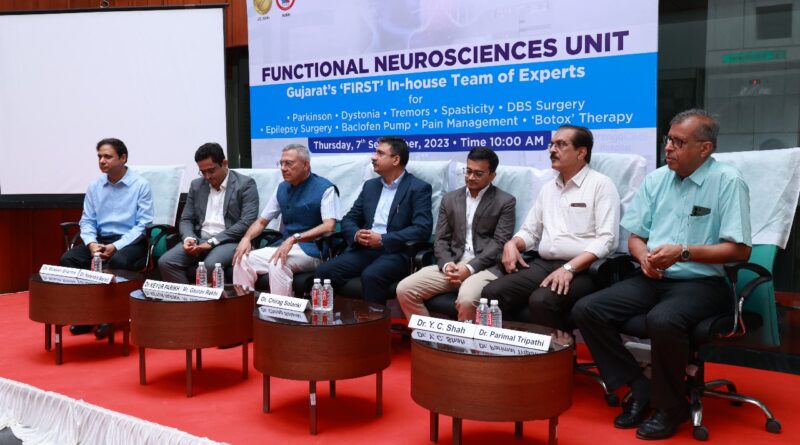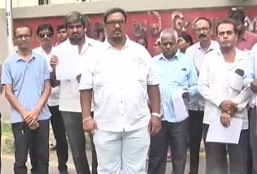Gujarat gets the ‘First’ Functional Neurosciences Unit’ at Marengo CIMS Hospital, Ahmedabad
- The Functional Neurosciences Unit is modelled to offer a comprehensive range of neurological care across various neurological diseases
- The ‘First’ Neurosciences unit in Gujarat will offer treatment solutions across several neurological diseases and disorders that are unexplored with a multidisciplinary team approach to achieve optimized outcomes
- The Functional Neurosciences Unit is backed by Gujarat’s First in-house team of experts for a diverse spectrum of neurological disorders
BILKULONLINE
Ahmedabad, Sept 8: In a significant stride towards establishing the most advanced treatment options for neurological disorders, Marengo CIMS Hospital announces the launch of a cutting-edge and advanced department of functional neurosciences, marking the “FIRST” in Gujarat. This state-of-the-art unit is poised to revolutionize neurological care for individuals in Gujarat, Rajasthan, and MP (Western India) through innovative technologies, interdisciplinary cooperation, and progressive methodologies. The unit’s focus extends to Parkinson’s disease, Tremors, Dystonia, Tics, Chorea, Drug-resistant epilepsy, Spasticity, Urinary incontinence, Various pain syndromes, and more. Ground-breaking treatments like Deep Brain Stimulation (DBS), Lesioning, Spinal Cord Stimulation (SCS), Sacral Neuromodulation, Vagus Nerve Stimulation (VNS), Epilepsy Surgeries, Brachial Plexus Reconstruction, and pain alleviation procedures to enhance a patient’s quality of life dramatically. The department is led by Dr Narendra Barad, Parkinson’s & and movement disorder specialist neurologist, and Dr Chirag Solanki, Stereotactic, DBS & Functional Neurosurgeon. They are supported by a dedicated team including Dr. Sandip Makani, DBS anesthetist; Dr. Shivani Nair, Neurophysiotherapist; Dr. Narsinh Chaudary, Neuropsychologist; and Utsav Vaghela, DBS nurse.
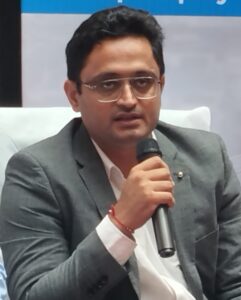
Dr Narendra Barad, Parkinson & Movement Disorder Specialist explains, “Parkinsonian disorders stem from insufficient brain chemicals, mainly Dopamine. Common symptoms include slowness in ADLs (Activities of Daily Living) such as bathing, eating, and mobility (e.g. getting out from the car or bed, etc.) alongside hand tremors, imbalance in walking; freezing while walking, sleep disturbances, urine and bowel issues, hallucinations, behavioral changes, altered speech, etc. Other Movement disorders encompass Dystonia (abnormal posturing of various body parts e.g. – cervical/neck dystonia, Blepharospasm, writer’s cramps, oromandibular dystonia, etc.), Tremor, Chorea (dance-like movement), Myoclonus (sudden jerks of body parts), Tics & stereotypies (sudden abnormal movement of limbs or vocal cords). Timely expert diagnosis and intervention hold the potential to enhance the quality of life for individuals facing these disorders.”
Dr Chirag Solanki, Stereotactic, DBS & Functional Neurosurgeon emphasizes, “Tremors and Parkinson’s disease are the most common movement disorders. While initial years may see positive responses to medications, drug efficacy often diminishes over time, accompanied by side effects.
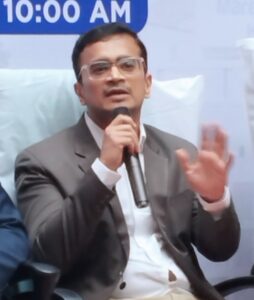 For dystonia, there is no definitive medical treatment available. Deep Brain Stimulation and other techniques have transformed the lives of countless patients worldwide. Still, there are a lot more patients who continue to suffer due to either the lack of awareness, failure to timely refer or lack of accessibility to these treatment avenues. The same is also true for problems like epilepsy, spasticity, incontinence, and pain. There is a gamut of options to treat drug-resistant epilepsy ranging from resections and disconnections to ablation, DBS, VNS, etc. that have the potential to cure a patient from epilepsy.”
For dystonia, there is no definitive medical treatment available. Deep Brain Stimulation and other techniques have transformed the lives of countless patients worldwide. Still, there are a lot more patients who continue to suffer due to either the lack of awareness, failure to timely refer or lack of accessibility to these treatment avenues. The same is also true for problems like epilepsy, spasticity, incontinence, and pain. There is a gamut of options to treat drug-resistant epilepsy ranging from resections and disconnections to ablation, DBS, VNS, etc. that have the potential to cure a patient from epilepsy.”
Dr Keyur Parikh, Chairman, Marengo CIMS Hospital says, “As a progressive healthcare provider, Marengo CIMS Hospital has taken significant strides in emerging as a leader in the industry with initiatives across various
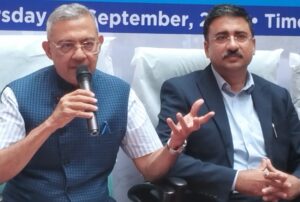
specialties. We have introduced several cutting-edge technologies to strengthen the clinical excellence we offer to our patients. By introducing the FIRST in-house Functional Neurosciences Unit of Gujarat, we aim to increase awareness of neurological movement disorders and diseases to ensure patients reach the right place at the right time for the right treatment.”
Gaurav Rekhi, Regional Director, West says, “Marengo CIMS Hospital has always been doing outstanding work in saving lives in every possible way. Neurological disorders may affect all stages of life, from seizures in children to memory impairment in the elderly. We, at Marengo CIMS Hospital, offer best of care in the field of neurology, through highly qualified neurologists and support by state-of-the-art clinical neurophysiology lab & and neuroradiology. Gujarat’s ‘First’ in-house Functional Neurosciences Unit at Marengo CIMS Hospital attempts to provide compassionate, latest, evidence-based, cost-effective care to all segments of society. Most of the neurology patients need individualized, but special care through a multidisciplinary comprehensive approach.”
Patients suffering from neurogenic bowel or bladder incontinence can get normal continence and leave behind the social stigma to live a quality life again by sacral neuromodulation. Similarly, there are a lot many advanced treatment options like drug pumps as well as spinal cord (SCS) and peripheral nerve stimulations (PNS) available to treat various pain syndromes which are refractory to medications and spasticity, beyond routine therapies like injections and RF ablations. The “Multidisciplinary team approach” is the core principle behind the Department of Functional Neurosciences which is indispensable to achieve best results and achieve top-notch outcomes.
To commemorate Indian independence, we have launched this unit to provide “freedom from disability”,” freedom from dependency”, “freedom from pain”, “freedom from fits”, and “freedom from worries of movement disorders”.

